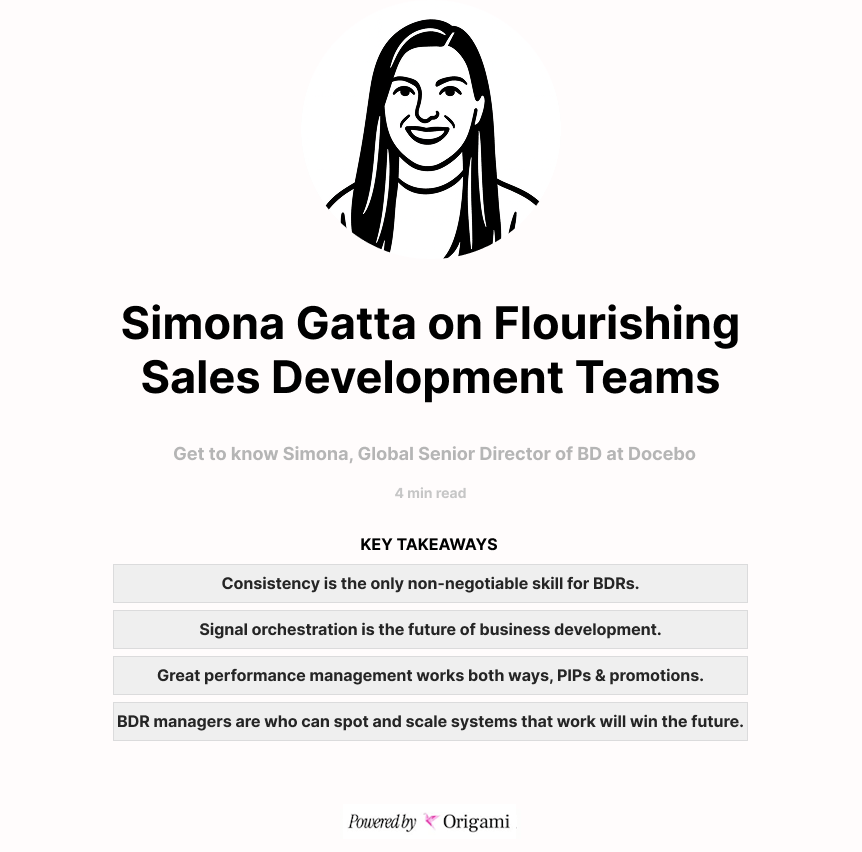
Simona Gatta is the Senior Director of Global Sales Development at Docebo, a 1000 person AI powered learning platform. She started as a BDR 7 years ago and has built her career from the ground up, becoming one of the most forefront leaders in AI and signal orchestration that will reshape the BDR function.
Her approach to team incentives + tech adoption that both improves rep lives and business outcomes is admirably skillful.
She sat down with Luke from Origami to discuss consistency as a superpower, signal orchestration, and building teams that stay and perform.
On consistency being the only skill that matters
The number one failing point isn't skill. It's consistency. Every single time. You cannot control if a prospect is in buying mode. But you can control showing up every day and executing strategic, relevant outreach + staying on top of your book of business.
BDR success is mathematical. If you have 100-300 accounts and call them consistently (with relevance!), you will hit between the 7th and 14th touch. That's not luck, that's math.
I've seen unbelievable cold callers who forget to follow up on warm leads. Then you put them on a PIP (to hit their ego) and suddenly they're top of the leaderboard.
They had the skill. They just needed the discipline.
On feeding reps the accounts that actually matter
For years, BDRs chose their own accounts + personas and did work on their terms. Not only leaving to them the huge responsibility of go-to-market but also layering huge discrepancies in human errors and subjectivity
We're shifting to full signal orchestration. Spot a signal and enroll them into pre-drafted sequences customized for that persona, industry, and account.
The BDR's job becomes proofreading the email, doing the cold call, and booking the meeting. No more choosing accounts. No more writing sequences from scratch.
On making top performers rich without promoting them
Sometimes people don't want to be managers. They just want to make more money. I think “cool, we've got you.”
We built levels within the BDR org (BDR, Senior BDR, Team Lead) with different base salary brackets and clear entry requirements. Everyone at the same level makes the same amount. I don't care about your background or degree. Hit the criteria, get the comp.
But the real money printer is acceleration. Once you hit 100% of quota, every opp after that is 150% commission. It's quarterly, not monthly, so one bad month doesn't kill you. We also have kickers on closed-won deals.
Some BDRs stay for two-plus years because they're making AE money while working eight-hour shifts.
It’s a beautiful thing when you can build great incentive structures.
On turning managers into pattern-matchers instead of task cops
When you orchestrate signals and sequences, the BDR manager role transforms completely.
It's no longer "Did you make your calls?"
It becomes: What's our reply rate by subject line? Which sequences are converting? What worked in this campaign that we should scale to the entire team?
We A/B test constantly. We saw emails getting 0.2% reply rates, so we killed them and added more calls and LinkedIn touches. LinkedIn became our number two channel after cold call, so we made all LinkedIn tasks urgent priority.
The manager's job is monitoring what works at the sequence level and scaling it across reps. That's where you actually move the needle. Not micromanaging dial activity.
But this only works when you have orchestration handling the research and targeting. Otherwise managers are stuck coaching processes (instead of optimizing good strategy).
That’s it for this week!
Thanks for wanting to know more today than you did yesterday! If you liked this edition, forward it to your a friend who would like it too 🤝
Find more Modern GTM interviews here.
Learn how Origami helps sales teams here.
‘Til next time!
